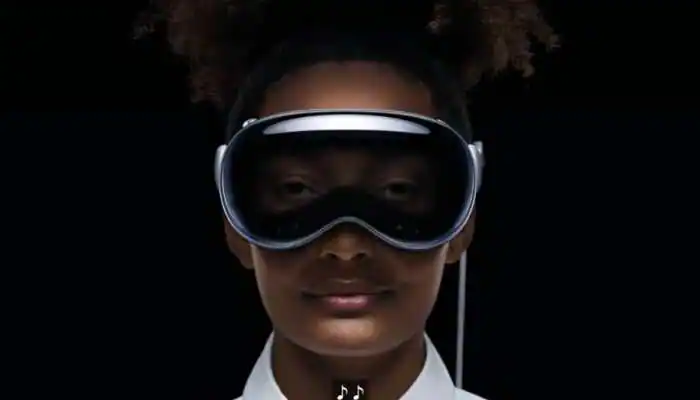New Delhi: Apple has officially unveiled its highly anticipated and long-rumored VR/AR headset called the “Apple Vision Pro” at the annual Worldwide Developers Conference 2023. This device marks Apple’s entry into the competitive landscape, challenging Meta’s Quest series.
The Apple Vision Pro is a revolutionary device that combines spatial computing, seamlessly merging digital content with the physical world. It offers an immersive experience while ensuring users remain connected and engaged with their surroundings and others.
Priced at $3999 (approximately Rs 3.25 lakhs), the Apple Vision Pro is a high-end offering. It is expected to be available for pre-order early next year, allowing enthusiasts to experience the cutting-edge capabilities of this advanced headset.
The device’s visionOS will work on the world’s first spatial operating system, meaning to let users interact with digital content in a way that feels like it is physically present in their spaces.
“Today marks the beginning of a new era for computing,” said Tim Cook, Apple’s CEO. “Just as the Mac introduced us to personal computing, and iPhone introduced us to mobile computing, Apple Vision Pro introduces us to spatial computing.
Apple Vision Pro Display
The breakthrough design of Vision Pro features an ultra-high-resolution display system that packs 23 million pixels across two displays, and custom Apple silicon in a unique dual-chip design to ensure every experience feels like it’s taking place in front of the user’s eyes in real time.
Immersive Environments: With Environments, a user’s world can grow beyond the dimensions of a physical room with dynamic, beautiful landscapes that can help them focus or reduce clutter in busy spaces. A twist of the Digital Crown lets a user control how present or immersed they are in an environment.
Engaging entertainment experiences: With two ultra-high-resolution displays, Apple Vision Pro can transform any space into a personal movie theater with a screen that feels 100 feet wide and an advanced Spatial Audio system.
World’s First 3D Camera
Featuring Apple’s first three-dimensional camera, Apple Vision Pro lets users capture, relive, and immerse themselves in favorite memories with Spatial Audio. Every spatial photo and video transports users back to a moment in time, like a celebration with friends or a special family gathering. Users can access their entire photo library on iCloud, and view their photos and videos at a life-size scale with brilliant color and spectacular detail.
All-New App Store
Apple Vision Pro has an all-new App Store where users can discover apps and content from developers, and access hundreds of thousands of familiar iPhone and iPad apps that run great and automatically work with the new input system for Vision Pro.
Eyesight Feature
Apple Vision Pro also features EyeSight, an extraordinary innovation that helps users stay connected with those around them. When a person approaches someone wearing Vision Pro, the device feels transparent — letting the user see them while also displaying the user’s eyes. When a user is immersed in an environment or using an app, EyeSight gives visual cues to others about what the user is focused on.
Apple Vision Pro Design
Apple Vision Pro builds on Apple innovation and experience designing high-performance products like Mac, iPhone, and wearables like Apple Watch, culminating in the most advanced personal electronics device ever. To achieve ambitious goals for performance, mobility, and wearability, Apple utilized the most advanced materials possible.
Optic ID
Optic ID is a new secure authentication system that analyzes a user’s iris under various invisible LED light exposures, and then compares it to the enrolled Optic ID data that is protected by the Secure Enclave to instantly unlock Apple Vision Pro. A user’s Optic ID data is fully encrypted, is not accessible to apps, and never leaves their device, meaning it is not stored on Apple servers.
Where a user looks stays private while navigating Apple Vision Pro, and eye tracking information is not shared with Apple, third-party apps, or websites. Additionally, data from the camera and other sensors is processed at the system level, so individual apps do not need to see a user’s surroundings to enable spatial experiences. EyeSight also includes a visual indicator that makes it clear to others when a user is capturing a spatial photo or video.
Source: Bureau
